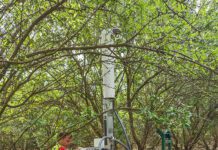Abraham Lincoln once said, “The best way to predict your future is to create it.” No one can foresee the future. You never know how long you have on earth, how long you will remain farming, or if your farm will be there for the next generation. You can plan though, and prepare for the future.
Succession planning helps create your farm’s future and ensure that it can be passed down to the next generation. Nationwide consultant, Ryan Patton, outlined five key elements to the transition planning process: succession planning, business planning, risk management, financial independence and estate planning.
“Estate planning is the last tool because you need to figure out who and how you are going to work with before you start planning. Having the tough conversations first will help you prepare better,” Ryan said.
Farmers rarely retire. They tend to work until the farm gets sold, they pass it down to family or they pass away. When farmers get older, they may collect rent off their property or become a silent partner. They generally depend on their farm income most of their lives. As people get older, they generally require more care. This care can often times be costly and unplanned. Farmers rarely have 401K packages or retirement plans to help them pay for these expenses. Often times farmers have to sell parts of the farm to pay for their healthcare as they age.
Too often, the needs or wants of the family aren’t communicated until it’s too late or too costly. Family may want to buy into the farm, but it could be too expensive if the cash needed for the older generation is immediate. With proper planning and communication, succession can be a positive process.
Succession Planning
Succession planning is an essential tool for ensuring the farm passes down to the next generation in a smooth and successful manner. It can be tough as a family to sit down and have ‘the talk’. Tough, but critical, to ensure the family farm sees the next generation.
Patton acknowledged family can sometimes carry past grudges into conversations about the future. He offers advice. “If you feel there is going to be an old grudge that is going to come up in conversation. Frame the conversations around what would the farm need.”
Making the farm a factor of consideration can help to put pressure off family members’ emotions and consider the farm as a reason. Does that make sense from the farm’s perspective? This question can help ensure the farm has a voice in the decision. Would it make more sense for everyone to own the farm or just the decision makers? Giving the farm a voice may help to alleviate some of the pressure from other members of the family as well.
[subhead] Business Planning
Business planning can be one of the challenging aspects of passing down the family farm. Tax law is a driver when deciding on the business structure you should consider.
“Individuals who keep land for life can hinder the next generation from being able to purchase or continue running the operation. However, current tax favors land to stay with current owner until they pass away.”
You need to confirm you are making the right business decision and ensuring the next generation can afford to keep the family farm into the future.
The biggest issue in business planning is land. Setting up a form of a business entity can ensure the land is thought after. The most typical entity Patton sees are Limited Liability Companies and S Corporations. However, he said, “There are several ways a family can structure their business, as long as the business entity involves both generations have joint ownership together. This will ensure the younger generation is able to generate cash flow and the older generation can still maintain rental income.”
When both sides are able to generate income, it will help lower their risk.
Risk Management
This leads to the next step, risk management. Setting up the business correctly so the farm will look after both generations involved provides the lowest risk. When the farm is only looking after the older generation, the young generation may not have enough collateral to be able to buy into the business. If the farm is only looking after the young generation, the older generation may not end up with enough cash flow toward the end to help take care of themselves. Risk management helps the farm reach a balance for all parties involved.
Patton noted it is important to identify, address and prepare for risk.
“There could be a need to plan for long term care expenses or supplemental income or insurance for either generation,” he noted.
Financial Independence
Financial independence is another key element to consider through the process. The older generation may have a desire to retire or take a smaller role on the farm.
“This could be a way to transition roles and even business relationships to the new generation. The older generation could offer a mentor role for the younger generation to learn more details and daily decision-making agreements,” he said.
Estate Planning
The final estate planning step for farmers is the transition to make agreements and discussions into a fully formed plan. Patton describes this step as bringing all the players together and finding your quarterback who is there for you.
“Your attorney will represent the legal side, the accountant will ensure the day to day makes sense financially, a farm lender can ensure the behind the scenes is funded, but you need to find the facilitator to help coordinate those conversations. Have a team of specialist involved,” he said. The advisor needs to be a champion for the farm, someone who understands agriculture and your farming practices.
Patton describes the Nationwide Land As Your Legacy program as a means to assist, “If the attorney says you need ten entities, we want to outline the options a farmer has and not just what the attorney and accountant say you need. Let the individuals pick what makes most sense.” The advisor will help everyone and ensures the farm stays a farm. The goal is to see agriculture continue and pass down to the individuals the family wants it to.
Every farm is unique; from the structure of the family, the company and even the crops they grow. When considering succession planning, it will be a process. It will be filled with tough questions that hopefully lead to the best outcome possible.

















